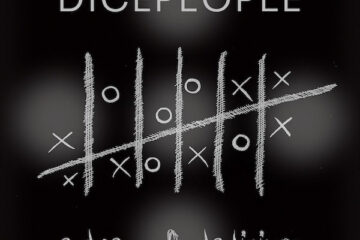Lounge pop perfection
Billing themselves as “post-punk electronic balladeers”, Cult With No Name (aka Erik Stein and Jon Boux) have carved out an intriguing career since originally forming back in 2004.
Following positive reviews for their 2007 debut album Paper Wraps Rock, Cult With No Name chalked up a steady release schedule of albums which also brought them into contact with such diverse acts as Tuxedomoon, Kelli Ali (Sneaker Pimps) and Japanese electronic artist Coppe’.
In 2015 the pair were commissioned by filmmaker Peter Braatz to compose music for the soundtrack to his documentary Blue Velvet Revisited. That project, which centred around David Lynch’s classic 1986 film, also saw both Tuxedomoon and John Foxx contributing to the score.

Mediaburn is Cult With No Name’s ninth studio album following on from 2017’s excellent Heir of the Dog. As ever, regular collaborators Blaine L. Reininger (Tuxedomoon) and Kelli Ali are on hand to lend their talents to Stein and Boux’s latest outing – and what an outing it is. What marks Cult With No Name out from a broad church of electronic music entrepreneurs is their ability to craft stylish pop that strives for an emphasis on mood and reflection.
On their latest album, Cult With No Name attempt to wrestle with a frenetic pop culture colliding with an increasingly dystopic political landscape. ‘Blind Dogs for the Guides’, which opens the album, typifies Cult With No Name’s talent for suave electropop. The duo eschews big synth-pop tunes, opting instead for a more subtle combo of electronic rhythms alongside Erik Stein’s mesmerising vocals. It’s a mood that crosses over on follow-up track ‘Needle and Thread’, which also employs some effective backing vocals from Kelli Ali.
The fragile beauty of ‘In Hollywood You Won’t Find Bel-Air’ showcases Cult With No Name’s particular flair for haunting piano-driven melodies with subtle electronic flourishes. Lines such as “It ain’t CGI, when the trucks roll on by/In a smog that soon filters the sky” offers a pointed reverie looking at chasing an American Dream which is no longer there.
BUY NOW
Meanwhile, on ‘She Sells Incels’, the duo dip into a more jazz-infused number. With a smooth sax crooning in the background, it provides an unusual bucolic accompaniment for a composition that delves into the seedier aspects of modern pop culture. The “Incel” concept (short for “involuntary celibate”) has become a reflection of sorts for the sense of entitlement (see also Spray’s ‘Get A Load Of This Guy’) that’s become more prominent in modern culture. Lines such as “Nice guys aren’t playing nice anymore/They’re talking rape with their friends” land with a more disturbing impact when delivered with a suave vocal presence.
The album jumps into a more electronic territory on ‘So Much Left to Undo’, whose layered synths outline a more political bent in its lyrics (“When people call for change, they want a future they can claim/Based on a past that they’re afraid did not exist”). It’s a timely slice of commentary, but also an indicator perhaps that some messages can be just as effective when delivered with a disarming gentleness.
One of the album’s sober highlights is laid out on the more melancholic ‘By Air or by Sea’. Here, the song’s seascape sounds are bolstered by a haunting violin (care of Blaine L. Reininger) giving this outing a more organic feel.
The duo delves into more ambient territory on ‘(No Such Thing as) Silence’, with its oddly evocative soundscape. This composition was actually commissioned by the Olympus Corporation and composed using ambient sounds solely captured via an Olympus LS-P4 mobile audio recorder.
Elsewhere, ‘Mona’ is another slice of elegant lounge pop (also a winning live number) where Stein’s vocal stands front and centre. There’s a hypnotic element to this intriguing paean to the world’s most famous painting, particularly the interpretation of its enigmatic smile balanced against our increasingly turbulent world.
‘All This Spite (Comes at a Price)’ seems to be an appropriate commentary on contrarian commentators (“They love the fact that I ‘Tell it like it is'”) delivered with polished piano-led melodies that have a ghostly aspect to them.
Closing proceedings are the contemplative tones of ‘Money’s Gone’ contrasted with the more electronic burblings of ‘Button on My Desk’.
There also has to be praise for Mediaburn’s superb packaging which comes courtesy of Bit-Phalanx (the outfit also responsible for the annual RPM electronic music festival). The fold-out elements of the CD with poster, download code and the chance for people to create their own jewel case if they wish, also employs a visually-striking design aesthetic (the lyrics are also given some suitably ambiguity in the maze-like way they’re laid out inside). It gives the whole affair a cool, physical presence that’s a step up from a standard CD release.
In conclusion, Mediaburn offers up a stylish collection of lounge pop perfection that also offers some pertinent commentary on modern culture. If Cult With No Name has yet to grace your radar, this is the album you should investigate.
Mediaburn is released 11th October 2019.
https://cultwithnoname.bandcamp.com/album/mediaburn
http://www.cultwithnoname.com/
https://www.facebook.com/cwnnofficial/
https://twitter.com/cultwithnoname
This article originally appeared on Wavegirl.










